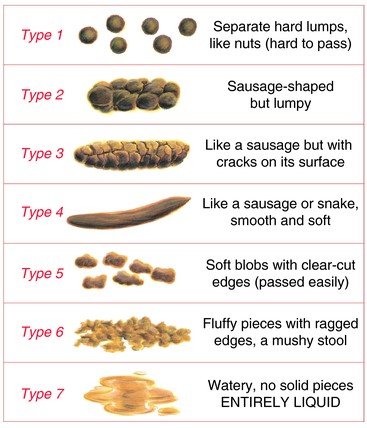THE BENEFITS OF OBSERVING YOUR BOWEL HABITS
When was the last time you looked in the toilet bowl and inspected your poo?
You may cringe at the thought of doing this, but if you’re not checking out your bowel movements you could be missing some very obvious signs that all is not well in your gut!
By observing your stools, you get a clearer picture of your bowel health and what YOUR normal looks like, because everyone is different.
Knowing YOUR bowel patterns and being able to discuss the details with your practitioner can provide useful insights into potential gut and digestive disorders, or simply help to assess fibre and hydration levels.
It also makes it easier to identify changes in bowel habits, which can be cause for concern - unexplained bowel changes can be red flags for diseases such as colon and ovarian cancer and should be investigated immediately.
how SHOULD YOU keep track of bowel movements?
The best way to keep track of your bowel movements is by using a stool diary. Stool diaries are available as paper-based or electronically-fillable forms (you can download the Gut Mechanic Stool Diary), or as an app.
Apps are ideal as they are easy to use, can’t get lost and the data can be downloaded and sent straight to your practitioner. Our clients have used Pcal - Poop Tracker (Apple) and Poopify (Apple or Android).
Example stool diary.
what should you be looking for?
You should be considering the following aspects when observing your poo (before and during wiping):
Consistency - What does it look like? Are food particles visible? Does it stick to the bowl or float? Is it greasy or oily?
Colour - What colour is it? Does the colour reflect what you ate?
Comfort - Was it easy or hard to pass? Do you feel fully evacuated?
Odour - How much does it smell?
Frequency - How many times have you pooed today?
what is normal?
Everyone is different, so the definition of 'normal' for stools is quite variable, however the Bristol Stool Scale (BSS) is the gold standard in assessing stool consistency in adults.
Image: Bristol Stool Scale
Types 1 & 2 = Hard stool, can be difficult to pass, painful or leave a feeling of incomplete evacuation. Is indicative of constipation, slower transit time.* (how long it takes for food to pass through the gastrointestinal tract)
Types 3-5 = Normal stool range, soft, painless, minimal odour and easy to pass.
Types 6 & 7 = Loose stool, may be accompanied by a sense of urgency, pain or cramping. Is indicative of diarrhoea, faster transit time.
*There are other tests we prefer to utilise to evaluate transit time more accurately.
Normal stool colour is usually a brown colour, although colour can be impacted by dietary factors (e.g. consuming lots of greens or beetroot) and medications.
Stool frequency is impacted by a range of factors, however 1-3 times a day, or every other day is within the normal range.
WHAT IS NOT NORMAL?
Stools that are excessively smelly, greasy and sticky, or that float and are hard to flush may indicate fat malabsorption or other gut & digestive-related health conditions and should be investigated.
Very dark red or black 'tarry' stools may indicate internal bleeding, whereas pale or yellow stools may indicate pancreatic issues - both are cause for concern and you should see your health practitioner without delay. Bright red streaks in the stool may indicate a haemorrhoid or tear, but bloody diarrhoea requires urgent medical attention.
In terms of bowel movement frequency, going any longer than 72 hours between bowel movements is cause for concern and should be explored further.
The appearance of undigested food particles can be an indication of less than optimal gut health, although some foods such as corn, nuts and seeds are hard to digest and are commonly visible.
In essence, a normal bowel movement should:
be soft and easy to pass
appear like type 3, 4 or 5 on the Bristol Stool Scale (BSS)
be within the spectrum of brown in colour
not be excessively smelly
not contain lots of undigested food particles
occur 1-3 times daily, or every other day.
HOW CAN WE HELP YOU?
Gut Mechanic has a passion for helping people experiencing gut & digestive health issues. Stool diaries do a lot to help us to understand your bowel health, however there a number of additional diagnostic tools available to us to enhance our understanding - such as stool PCR and metagenomic testing. We have a range of methods we can then employ to modulate stool consistency, quantity and frequency, and therefore ease bowel movement-related pain, discomfort and anxiety.
If you would like some help optimising your bowel health, click here to make an appointment.
Disclaimer: The information provided herein is for general information purposes and should not be construed as medical advice. Any reliance on the information provided is done at your own risk. This information is not intended to serve as a substitute for professional health care and should not be used for diagnosis or treatment. If this information has raised some concerns for you, or you wish to make changes relating to your health, or you suspect you have a health problem, you should consult a qualified health professional for advice relating to your specific circumstances. Whilst the author makes every effort to provide accurate information, the author makes no guarantees or promises and assumes no liability regarding the accuracy, reliability or completeness of the information presented. Any third-party materials or content referenced does not necessarily reflect the author’s opinion, standards or policies, and the author does not assume any liability for them whatsoever.



